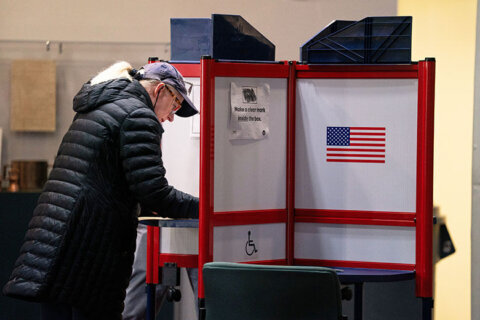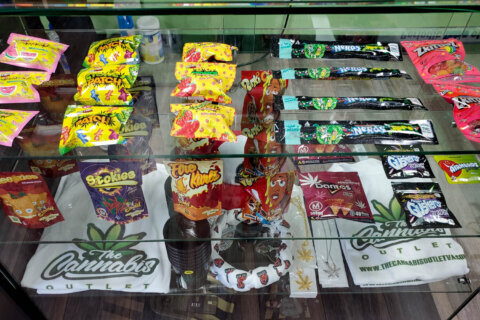Three California men who took part in the deadly white nationalist rally in Charlottesville, Virginia, received comparably lighter sentences Friday after a federal district judge rejected a hate crime designation.
Benjamin Daley, Thomas Gillen and Michael Miselis had pleaded guilty earlier to federal rioting charges over the Aug. 12, 2017, “Unite the Right” rally. The three members of the “Rise Above Movement” — a now-defunct militant white-supremacist group — each faced up to five years in prison.
Instead, Daley got 37 months, Gillen got 33 months, and Miselis got 27 months. District Judge Norman Moon said prosecutors didn’t prove beyond a reasonable doubt that the three chose their victims because of race, religion or other protected categories.
Earlier Friday, testimony focused on whether or not the crimes were motivated by hate — a hate crime enhancement — which could have resulted in the more severe sentence.
Prosecutors showed Moon video and still photos of the three before, during and after the rally, in which Heather Heyer was killed. James Alex Fields Jr. drove his car into a group of counterprotesters — he’s been sentenced to life in prison for the murder.
In one photo, the three are pictured in a rented van, traveling to a rally in California; all three are making what prosecutors said is a white power gesture.
“These defendants, motivated by hateful ideology, incited and committed acts of violence in Charlottesville, as well at other purported political rallies in California,” U.S. Attorney Thomas Cullen said in a statement later Friday.
“They were not interested in peaceful protest or lawful First Amendment expression. Instead, they intended to provoke and engage in street battles with those that they perceived as their enemies.”
Attorneys for the three defendants argued that prosecutors failed to present any evidence that showed the violence was prompted by the victims’ race, religion, gender or other protected classes.
Video was shown of the white nationalists walking two-by-two near Emancipation Park, after it had been closed by police. At some point, the three were involved in physical clashes with counterprotesters who lined the street.
“These guys have morally reprehensible views,” said Lisa Lorish, defense attorney for Daley, but added that the victims “got in the way and the defendants committed assaults.”
Gillen’s attorney, David Eustis, told the judge: “The counterprotesters got involved because of what they were doing, not who they were.”
Gene Cox, the attorney for Miselis, said the group’s anti-Semitic and racist words and book burning were all First Amendment-protected speech. “If this is an anti-Semitic organization, they’re the world’s most incompetent anti-Semitic organization,” because they didn’t know whether their assault victims were Jewish.
Prosecutor Chris Kavanaugh disagreed: “In the book burning photo, they’re burning ‘Diary of Anne Frank’ and ‘Schindler’s List,’ with a pork chop on top, while making the Nazi salute — to say there’s no link to the people is not true.”
Cullen noted that when Miselis’ room was searched, the aerospace engineering Ph.D. student had 1,000 rounds of ammo and a book called “How to Bomb the U.S. Government.” Both prosecutors and the judge agreed that of the three defendants, Miselis was the most violent in Charlottesville.
As for Daley, the judge said he was “the leader of the group in almost every respect.”
Prosecutors displayed texts between Daley and his mother, in which she expressed her concern about her son. “This is violence, this is not self-defense,” she texted. “Your message is violent — you are not being excommunicated from the family, but your world is going to continue to shrink.”
In the text exchange, Daley insisted Jewish people were responsible for many of the world’s ills. His mother replied: “You have never been harmed by any Jew or Black.”
Gillen had the most previous convictions — underage possession of alcohol, intent to sell marijuana, possession of a firearm without a serial number — but prosecutors said that there was no indication Gillen threw punches, and that he was the least violent of the three.
Eustis said his client Gillen “was in a marijuana haze” at the time, and that if there was an upside to being in the white supremacist group, it was that they believed in “clean living.”
WTOP’s Neal Augenstein reported from Charlottesville, Virginia. WTOP’s Jack Pointer also contributed to this report.








